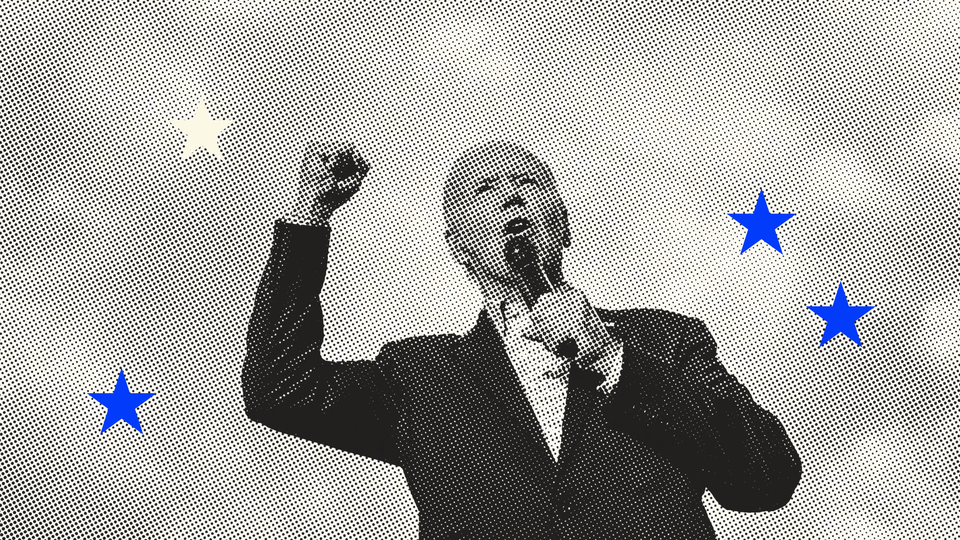The Rebellion Against Biden Is Over
4 min read
The Democratic insurgency against Joe Biden’s candidacy has ended—or at least, it’s been driven underground.
Since the president’s disastrous performance in a debate nearly two weeks ago, the race has felt unstable, as though history were about to turn sharply. People who had stood by Biden suddenly got cold feet. Disturbing reports about his private struggles began to emerge. Elected Democrats and even a senior White House official (albeit anonymously) called for him to drop out, and donors said they’d close their wallets.
The July 4 holiday and the weekend gave Biden some respite, but as the week started, more Democrats called for him to leave. Even Representative James Clyburn, perhaps Biden’s most essential ally, looked like he might be wavering. The ground was shaking, the dam was breaking: Pick whichever cliché you like, but Biden looked like he was done, no matter how defiant a pose he struck.
Yet by yesterday afternoon, Biden seemed to have quelled the rebellion. The rate of defections has slowed. The Congressional Black Caucus and Congressional Hispanic Caucus both reaffirmed their support on Monday. “I’m with Joe,” Senate Majority Leader Chuck Schumer reiterated, several times, yesterday. A group of Senate Democrats, led by Mark Warner, that wanted to nudge Biden out called a meeting off. Senator Michael Bennet said he believed Trump will win in a landslide—but declined to call for Biden to drop out. Representative Alexandria Ocasio-Cortez, the most prominent House leftist, also backed Biden. Representative Jerry Nadler, who had privately suggested Biden bow out, waffled.
In one of the most confounding statements of the whole sequence, former Speaker Nancy Pelosi said in an interview this morning that Biden must consider his choices, as though he has not been very clear about what he wants to do. “It’s up to the president to decide if he is going to run,” she said. “We’re all encouraging him to make that decision. Because time is running short.”
What happened that allowed Biden to calm the storm after more than a week of flailing? His interview with George Stephanopoulos on Friday, though not exactly inspiring, was adequate. A Monday phone interview with MSNBC’s Morning Joe was downright vinegary, even if Biden acknowledged using notes. The Biden campaign was also able to cherry-pick new polls that show the president tied with Donald Trump and closing the gap in key swing states, even though generally, polls show Biden losing a bit of ground since the debate.
Perhaps the most effective thing was Biden’s show of defiance. Immediately after the debate, his team seemed unsure how to respond, and it took more than a week for him to sit for a major national interview. Yet Biden’s intense pushback in that interview and since, including a letter to congressional Democrats, seems to have cowed the party a bit.
Biden’s allies have tried to paint anyone who wants him to drop out as a bad-faith critic who is aiding Trump, but that’s unfair. Many of them have been steadfast Biden supporters and have praised his presidency. They are nervous now because they view the possibility of a Trump victory as perilous. No one can dispute that changing candidates at this stage would be a risky maneuver. What is new since the debate is the sense that the risk of sticking with Biden is now at least as great as the downside of nudging him out.
Because these critics are motivated by fear of a Trump victory, however, some are wary of a drawn-out public argument that could weaken Biden but fail to force him out, so Biden’s defiance has brought them up short. This moment is reminiscent, in a strange way, of October 2016, when many Republicans wanted Trump removed from the ticket after the release of the Access Hollywood tape. When Trump stood pat, the energy against him dissipated.
If Biden can ride out the next nine days, Democratic National Committee rules will make it much harder to remove him. None of the problems facing Biden’s candidacy are gone, though. First, as I noted the other day, Biden’s argument before the debate was that once Americans saw Trump onstage, they’d remember why they disliked him. That didn’t happen. Now Biden’s argument is that the race is still close—but he isn’t articulating a clear case for how he’s going to change a race in which he has been consistently trailing for months.
Second, if you somehow still believe that Biden’s struggles on the stage were a onetime issue, then you might be satisfied with his pushback. But one or a few steady appearances can’t erase the bad one, and the chance that Biden will have another unsteady moment, even if it’s not as serious, seems very great. The moment that happens, any confidence he’s managed to instill will evaporate once again, and the rebellion will be back in action.



